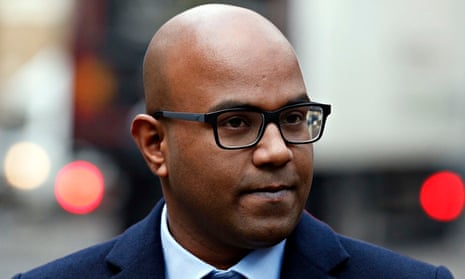A doctor accused of carrying out female genital mutilation was extremely trustworthy and had a very good clinical record, a court has heard.
And a consultant in charge the day he allegedly carried out the illegal procedure said she did not think “anything significant had been done wrong”.
Dhanuson Dharmasena, 32, stands trial accused of carrying out the procedure at the Whittington hospital in north London, in the first prosecution of its kind in the UK.
It is alleged that he illegally stitched a young mother back up after she gave birth in November 2012 – effectively redoing the FGM carried out on her as a six-year-old in Somalia.
But Vibha Ruparelia, the consultant on duty in the labour ward that morning, said she decided to leave the stitch in as she did not think anything seriously untoward had happened.
She told London’s Southwark crown court she thought it would be humiliating for the woman to remove it.
Asked by Charles Foster, one of the barristers representing the doctor, if “his [Dharmasena’s] clinical record was immaculate”, she replied: “It was very good.”
Foster added: “You regarded him as extremely trustworthy and clinically sound?”
Ruparelia replied: “Yes.”
Foster said the woman, known only as AB, should have been sent down the FGM treatment pathway before labour, but was not.
This left Dharmasena “facing the clinically nightmarish scenario with the patient in labour known to have FGM for the first time,” he said.
Jurors heard that Dharmasena pulled the consultant to one side after restitching the 24-year-old mother after a midwife had raised concerns that he may have carried out illegal FGM.
She told NHS trust investigators she believed he had carried out the stitch at the insistence of another man, Hasan Mohamed.
But she told jurors that, while he stitched the woman back in a way he should not have, she did not think serious harm had been done.
Foster said: “If you had thought there was anything seriously inappropriate about what Dr Dharmasena described to you, you would have ensured that the sutures were removed?”
Ruparelia replied: “Yes, that’s right.”
Foster continued: “The fact that you didn’t indicates that at the time you didn’t think there was anything significantly wrong with what had been done?”
The consultant replied: “No, I didn’t think anything significant had been done wrong.
“From my understanding the stitch was necessary and the only issue was whether it should have gone across the skin edges or if there should have been one on either side.” She said the sutures should have been done on each side, not across the opening, but she said she “didn’t think any harm had been done”.
Ruparelia therefore decided the stitch would be left and it should be treated as a training issue.
However, jurors heard that Ruparelia believed Dharmasena was talking about a different Somalian woman with FGM when they were discussing the patient. Ruparelia said that, in hindsight, she would have gone to see AB herself had she realised, but her care would not be any different.
Dharmasena denies one count of female genital mutilation.
Linked to this, a second man, Mohamed, 41, is facing one count of abetting Dharmasena in committing the offence. Mohamed faces an alternative count of encouraging or assisting the commission of an offence. He denies both counts.
In a statement to police, Dharmasena branded FGM an “abhorrent practice” and said he had never dealt with a patient that needed deinfibulation – the reversal of FGM – before.
He said: “I regard FGM as an abhorrent practice that has no clinical justification whatsoever and is well known to carry a number of risks, some of which are serious. Prior to my involvement with patient AB on the 24 November 2012 I had never dealt with a patient that required deinfibulation prior to or during delivery.”
He said he had not received specific training in relation to FGM legislation and how it affects antenatal care.
And he said he was not aware that resuturing each side separately was the preferred option.
He said he sought advice from Ruparelia and said “she did not imply that the suturing I had done was illegal, but it was against trust policy”.
He added: “At the time I believed I was acting in my patient’s best interests in closing the incision I had made to facilitate delivery. I now understand this was an opportunity to partially or fully deinfibulate the patient.”
The trial continues.
